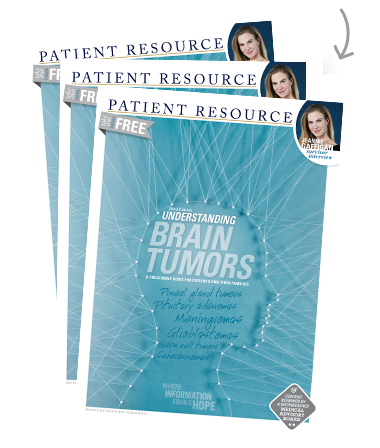Brain Tumors
Caregiving
Few people with a loved one undergoing brain tumor treatment have the training or experience for the role of caregiver. You may find you need to assist your loved one as he or she experiences frequent mood swings, emotional outbursts, memory issues, communication difficulties and personality changes caused by the tumor and its treatment.
And all this happens while you’re working through your own emotions and fears caused by this serious diagnosis. It’s common to feel overwhelmed and unprepared, but keep in mind that you already possess skills for giving encouragement, offering comfort, providing companionship and so much more. You should also accept help from friends, family members and your community. Together, you can make a significant difference for your loved one.
To better understand what is expected of you, learn as much as you can about your loved one’s diagnosis, including the specific type and grade of tumor as well as the various treatments planned.
Your duties may include the following, among many others.
Attend medical appointments. This is a crucial function, as your loved one may find it difficult to absorb and remember information.
Provide transportation. You can also work with a nurse navigator to find alternative transportation options.
Share medical updates. Use a group email or social media site to ensure friends and family receive the same information. This will relieve you from having to repeat updates multiple times.
Be alert to side effects. Learn which side effects to watch for, when they will likely occur and how to manage them (see Side Effects). Minimizing and managing them may improve your loved one’s outcome and will improve his or her quality of life. Check with the doctor before using over-the-counter medications. Avoid remedies others suggest; rely on the doctor for advice on the right methods to use. Report side effects as soon as they occur. Your prompt attention could prevent a potentially life-threatening situation.
Buy groceries and cook. Consider any dietary needs and your loved one’s preferences when preparing meals. Thoroughly wash all fruits and vegetables. Accept friends’ offers to bring meals, and provide detailed information about any dietary restrictions. Meals that can be frozen to serve later are ideal. Meals built on healthy, nutritious foods will help promote healing during treatment.
Care for children. Help your loved one enjoy some downtime by taking the kids on an outing. Entertaining kids doesn’t have to be costly — an afternoon at the park or in the library is fine. If your loved one prefers not to be left alone, plan an at-home activity, such as making posters or get well cards for the parent who is undergoing treatment.
Become a pet sitter. Take the dog for a walk or to the dog park. Pet treats and toys are always a nice surprise. Consider boarding pets if your loved one will be away from home for an extended time.
Don’t forget to take care of yourself. Many caregivers experience physical and emotional fatigue or burnout from neglecting their own needs for good nutrition, adequate sleep, exercise and social interaction.
A Caregiver's Checklist for Medical Visits
Appointments can often seem overwhelming because there is so much new information. You can make the experience more positive and productive for your loved one with the help of this checklist.
Before the Appointment
Preparing the day before will reduce stress for you both.
- Confirm date, time and directions to the facility
- Make a list of questions.
- Identify symptoms; summarize concerns
- Update medications list.
- Note contact information for all physicians.
- Gather medical files, insurance cards, ID, medications list, questions, etc.
During the Appointment
Encourage your loved one to take the lead.
- State main concerns first.
- Help accurately describe symptoms.
- Note/record doctor’s instructions.
- Ask questions; state any other concerns.
- Discuss recommendations.
- Ask when to seek immediate medical attention.
- Verify next steps.
Before Leaving the Facility
Confirm that you’re authorized to receive the patient’s information.
- Schedule follow-up appointments.
- Ask if prescriptions are being called in to the patient’s pharmacy.
- Verify you’ve received all printed instructions, prescriptions, referrals, etc.
- Ask how/when you’ll get lab/test results.
- Request after-hours contact information if needed.
- If your loved one’s care facility has an electronic patient record (known as MyChart), request access and ask how soon new information is posted.
After the Appointment
Immediately stress positive aspects of the appointment.
- Discuss the visit, referring to your notes.
- Give your loved one space to process the information.
- Make a plan together to implement the doctor’s recommendations.
- Pick up prescriptions and/or over-the-counter medications.
- Update friends and family (if applicable).
- Update calendar with new appointments.



